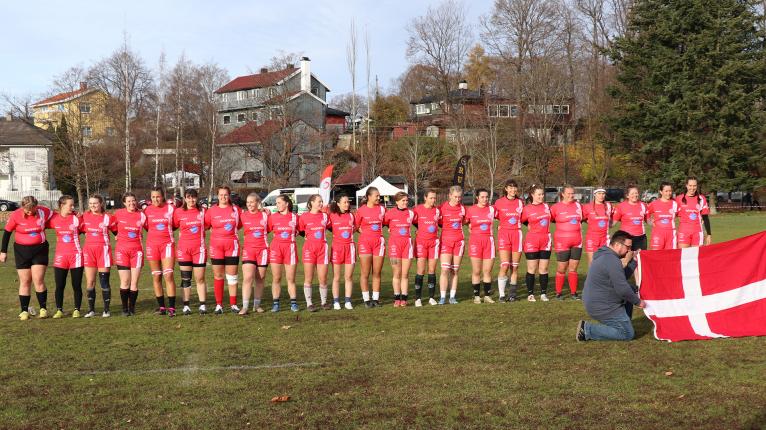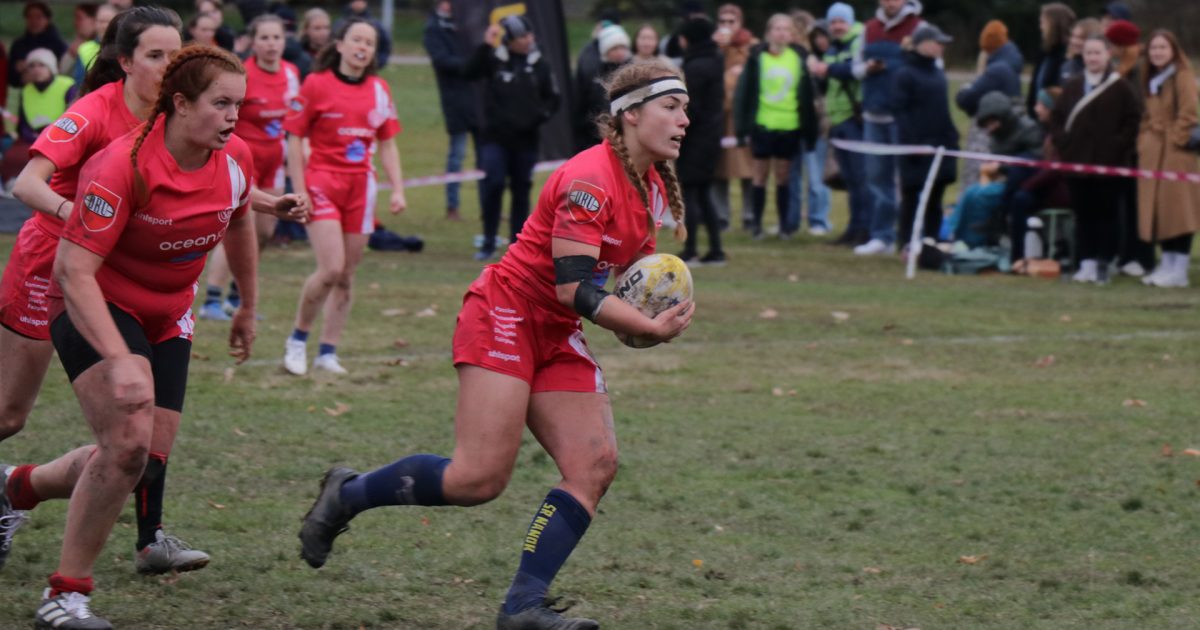Denmark’s Valkyries come out fighting in first game for 20 years

Talk to any stalwart of the women’s game about the history of their team and you will likely get at least one tale of dedicated individual coaches and passionate players summoning all their collective strength and experience to drag their team over the line – the sideline, that is. Getting onto the field of play is frequently the challenge, not making it over the try line.
The story of Denmark women’s first (unofficial) game of XVs in 20 years is one more such story. In fact, although the Scandinavian nation is not exactly world famous for its rugby culture, a close look at the re-emergence of its women’s side reveals that everything about its recent success connects to the bigger picture of women’s rugby: its past, its present, and its future.
Anyone familiar with the rankings will know that a quirk of the system is the way dormant teams inadvertently maintain their ranking because, by not playing, their score is never affected by the results around them.
Denmark is currently the highest ranked of these teams, sitting in 35th – ahead of Brazil (41st), who will play in RWC 2025 and four of the five teams scheduled to play in Rugby Europe’s 2025 Conference division: Romania (40th), Latvia (47th), Norway (49th), and Bulgaria (53rd).
Denmark’s Valkyries (the team nickname) playing an official game in the near future could shake things up significantly.
Indeed, any Test match they play would likely be against one of these teams. The unofficial match against Norway on 2nd November, which Denmark won 0-7, partly came about because Norway, now playing in a Rugby Europe competition, wanted some more game time.
The team expressed their interest to Nina Vistisen, one of the Danish rugby coaches, asking if the mostly sevens-based culture might be interested in trying the XVs format.
Vistisen, a former Loughborough Lightning and Saracens player in the Premier 15s (now Allianz Premiership Women’s Rugby), sniffed an opportunity and sprang into action.
View this post on Instagram
Vistisen’s return to the Danish set-up in 2022, bringing her experience from the England Sevens development programme as well as her XVs expertise, has seen the team achieve their best-ever results in Rugby Europe’s Sevens Trophy. The feelers she put out to players since her return suggested there might also be enough appetite and quality to push forward with XVs.
This increased interest in the XVs format is part of a wider Nordic rugby revival. Sweden, one of the early pioneers of the women’s game, set the standard and currently play in the Rugby Europe Championship while Finland are the current best of the rest, playing in the Rugby Europe Trophy, the second-tier competition.
The recent addition of a third tier, the Rugby Europe Conference, reflecting the growth in the women’s game, has inspired Norway to revive their own team this year and has shown Denmark what can be done.

The Nordic tradition of working together has also been on show, with Göteburg Rugby Club, Sweden, hosting training sessions in 2022 for any interested Danes and Norwegians to get up to speed with the laws, systems, and tactics of the longer game.
As with the women’s game in many countries, until recently, the rugby culture in both Denmark and Norway has primarily been centred around sevens, partly because of its status as an Olympic sport and partly because it is simply easier to get a team of seven players together regularly.
The three sides even share a social t-shirt design, emblazoned with ‘Nordic XV’. They might be rivals on the pitch but, off the pitch, they are willing to pool their resources to advance together.
That said, these off-the-pitch allies contested the game on the pitch fiercely. The match that developed bore all the hallmarks of an emerging women’s international side, as a core of sevens players initially struggled to apply their skill set to an unfamiliar game – with some unfamiliar teammates.
The Valkyries’ 1-3-3-1 system was visible in the first half but their shape was far too flat and, as referee Emmanuel Jacques observed, both sides were a little hesitant in the early set-plays.
Amanda Højberg, who started in the 11 jersey, explained that, “Adapting to XVs was challenging; it felt like playing an entirely different sport. That said, I think transitioning from sevens to 15s is somewhat easier than the reverse. In sevens, there’s a strong focus on individual skills, which in my opinion transfer well to the larger format. However, XVs bring a distinct level of complexity, especially in coordinating a team of fifteen players compared to the simplicity of organizing just seven.”
View this post on Instagram
Kathrine Kirk, substitute back, agreed, saying, “A lot more strategy is needed in XVs – thinking several moves ahead, different people have different jobs. Where in sevens you are more of a generalist.” She added, “It felt like a work in progress even during! We were finding our feet in the first half and in the second things started to slowly click. We made hard work for ourselves but we learned from it.”
That commitment to learning as they played was clear. Rugby has never been for the faint-hearted and, after juggling their training around work commitments, finding sponsorship to supplement the development income from World Rugby, and, in the case of co-captain Gabriella Skov, flying over from the UK where she plays for Guildford Tigers, the Danish side were clearly determined to have an impact.
They came out in the second half with much more confidence and fluency, and noticeably progressed in comfort and decision-making throughout the third and fourth quarters, scoring their try on the 60-minute mark after forcing Norway into one too many disciplinary lapses and then seizing control of the game for the final quarter to prevent their opponents retaliating.
As so often with rugby, the final scoreline did not reflect the fascinating tussle. One of the most interesting battles was in the set piece, especially given the predominance of sevens players in both teams. While the Norwegian maul was obviously stronger, Denmark’s scrum consistently overpowered their opposition and it is noteworthy that, among the reflections from players after the game, the two substitute props, Amalie Engbo Salling and Eva Olivia Harrit Nyberg, were particularly positive about the experience and the team’s success.
In typical prop fashion, Nyberg prioritised the scrum in her assessment of the game, saying, “I think we were very dominant in the game, even though it didn’t show on the score. We were dominant in possession and scrums.”
Every player spoken to for this piece highlighted areas where the team could improve and also identified personal ambitions to push themselves and the red-and-white jersey forward – they clearly have no intention of sitting back and relaxing after their first success.
Co-captain Emilie Trouillard, who began the game at fly-half and moved to scrum-half for the final quarter, was frustrated that they couldn’t convert their possession into points efficiently. However, she also praised her team’s defensive efforts, highlighting their ability to keep a clean sheet in their first game and the way their collective motivation smoothed out the problems they faced in preparation and during the game.
In fact, the players consistently spoke about how well the coaches had managed to prepare them despite only having two formal coaching sessions. The coaches themselves acknowledged that challenge, with around 90% of the matchday 23 having never played a game of XVs before.
Vistisen clearly relished the challenge, however. She observed that, while they had to balance teaching the basics while also instilling enough team structure to play a cohesive game, “This experience pushed the coaching staff to really reflect on the ‘how’ and ‘what’ of the key elements of the XVs game we chose to cover, and it also sparked ideas for our coaching ambitions in the future and all the fun elements you can play around with in the XVs format.”
The first Danish @RugbyDenmark try for 20 years!
It was also the only score in a game won by Denmark against Norway 7-0https://t.co/8F62jDLdMD pic.twitter.com/iF0dAzUMb8— Scrumqueens – Women’s Rugby (@ScrumQueens) November 2, 2024
Often in rugby, we talk about ‘Test match animals’ on the pitch, those players who thrive under the most intense pressure and can lift a whole team with their sheer determination to win.
Time and again, women’s rugby has been filled with such characters off the pitch too – coaches, players, and backroom staff whose determination to play will face down any challenge. While aware of the demands of the sevens calendar as well as professional commitments, coaches and players seem determined to meet this next challenge head-on.
The goal is to play two official matches in 2025 with another development game on top of that and, looking further ahead, to compete in Rugby Europe’s Conference. Sponsorship is secured for next year, with Ocean.io, the company who also sponsors the sevens side, excited by the prospect of helping to develop the women’s game further in Denmark.
Michael Heiberg, the CEO says, “Sponsoring the sevens team last year was a fantastic experience and this feels like a natural progression to increase the visibility of women’s rugby in Denmark. We are so excited to help this team reach the main stage of international rugby.”
The Valkyries have fought hard to get over the sidelines onto the pitch and they clearly have no intention of stopping now.
Denmark Starting XV (1-15):
Lucy Rebecca Davies; Malou Krøll Sebens; Nynne Romme Nygaard; Gabriella Skov (co-captain); Thea Cecilia Nicholas; Iben C. J. Pedersen; Patricia lmaz Martínez; Alma Mandrup Clausen; Julia Anne Epstein; Emilie Trouillard (co-captain); Amanda Højberg; Mille P. B. Elmbak; Clara V. C. Grangien; lmke S. Binderszewsky; Nina Dorthea Løvengreen.
Bench:
Amalie Engbo Salling; Sofie Nørgreen; Eva Olivia Harrit Nyberg; Kinza Olsen Riahi; Anne-Mette H Sundahl; Julia Kamille Ferris; Kathrine Kirk; Sara Kate Fahlen.










































































*Guildford Gazelles (not Tigers)